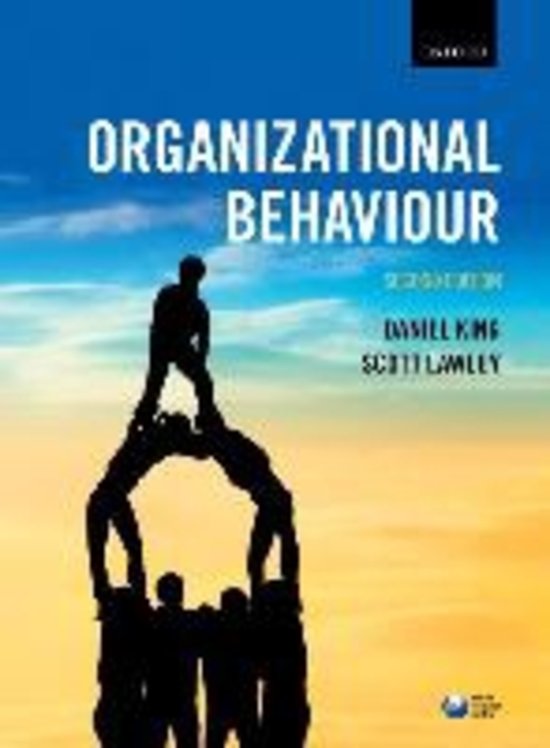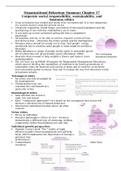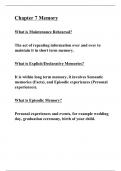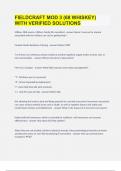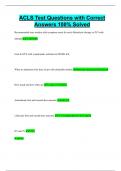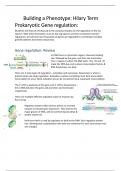Organizational Behaviour Summary Chapter 17
Corporate social responsibility, sustainability, and
business ethics
Trust in business has eroded and needs to be reconstructed. It is very dangerous
if a country doesn’t trust the private sector
Corporate reputation, brand image, prevention of increased legislation and the
maintaining of ties with key stakeholders are at stake
It can open up to new customers giving the firm a competitive
advantage
All business activity, to be able to survive, requires a level of trust
and moral action – otherwise the entire system quickly disintegrates
Business ethics should be taught not to stop “bad people” acting
unethically but to sensitize good people to what might be unethical
decisions
Wilful blindness=a group of people tacitly agree to outwardly ignore
sth of which they are all personally aware (Zerubavel, 2006) The 3 overlapping
Heuristic device=used to help simplify a theory and make it more theoretical frameworks
understandable
The UN have set up PRME (Principles for Responsible Management Education),
which aims to develop the capabilities of students to be future generations of
sustainable value for business and society at large and to work for an inclusive
and sustainable global economy: they aim to change the way that education works
in business schools.
Teleological ethics
An action can only be judged by
its consequences
Utilitarianism=you can
calculate the cost-benefit of a
particular action
Deontological ethics
Asks whether the action is
right, fair and honest
Kant: “categorical imperative”=act based on the assumption that action will
become a universal law of human behaviour
Libertarian=individual freedom above all other
concern
Virtue ethics
Focus on individual
Feminist philosophy=”ethics of care” women
demonstrate a different way of reasoning, seeking
compromise rather than blaming one side only
Individual growth perspectives
Stephen Covey's book "The 7 habits of highl
effective people"=time-management and self-help
book, which emphasizes the importance of having a
personal vision in balancing personal, family and
professional responsibilities developing an ethical character
communitarianism= we do things for the good of the community rather than
ourselves
, The economic framework for ethical action
Karl Marx: the economic structure shapes society, and society exists to maintain
and legitimize the economic system our central ideas are a product of the
superstructure (family, education, religion, mass media, politics, etc) and our
actions are constrained by the economic system
capitalism=economic system in which we (in the West) live & where capitalists
owns means of production and workers sell their labour
Friedman
Companies are the shareholder’s property and therefore should be run exclusively
in their interest
Because managers are not trained in solving social problems, they should not be
required to tackle them
Adam smith: the market has an “invisible hand” the promotes the greatest good
for all
o Ethical egoism=people acting in their own best interest is the best way to get a
good society
o Shareholder capitalism is the most effective way of increasing overall wealth
and produces increased benefits for all
o The goal of the economy should be wealth creation rather than wealth
redistribution
today many corporations give money back to society (e.g.investing in local
community projects)
Critique on shareholder capitalism model
Tragedy of the commons=tragedy of the commons=because one individual acts in
his own interest (and every individual therefore does this), the common interest
will suffer: every farmer can put 1 cow on the grassland (one farmer decides to
put 2 on it, so everyone followes and the grassland got destroyed)
if everyone acts in their best self-interest, our common interests are not always
served
Such failures are called “market failures”, when negative effects of a transaction can
fall on a third party
Externalities or spillover costs=side-effects (positive or negative costs on society)
Utility=Benefit an individual might gain
To maximize profits, businesses in fact transfer the true cost of transactions to
society, e.g. pollution
The average CEO earns more in 3 days than the average employee makes in a
year
o Wilkinson & Pickett: it is not the overall level of wealth which matters, but the
level of inequality: the greater th gap between rich and poor, the higher the
levels of crime, health problems, unhappiness, drug addiction, and
environmental problems
The goal of society should be to increase equality rather than focus on economic
growth
Stakeholder capitalism
Stakeholder=someone who has an interest or claim in the activities of the
organization; could be impacted by the actions of the organization
Firms have to act within the interest of society because otherwise society will
withdraw its support and prevent them from existing
o Businesses can’t operate without their employees and customers=part of
securing long-term sustainable growth will be about rebuilding public trust in
business
Business ethics:
o Business actions should be fair (social justice/deontological)
o Importance of placing community above individual interests (communitarian
ethics)
Corporate social responsibility, sustainability, and
business ethics
Trust in business has eroded and needs to be reconstructed. It is very dangerous
if a country doesn’t trust the private sector
Corporate reputation, brand image, prevention of increased legislation and the
maintaining of ties with key stakeholders are at stake
It can open up to new customers giving the firm a competitive
advantage
All business activity, to be able to survive, requires a level of trust
and moral action – otherwise the entire system quickly disintegrates
Business ethics should be taught not to stop “bad people” acting
unethically but to sensitize good people to what might be unethical
decisions
Wilful blindness=a group of people tacitly agree to outwardly ignore
sth of which they are all personally aware (Zerubavel, 2006) The 3 overlapping
Heuristic device=used to help simplify a theory and make it more theoretical frameworks
understandable
The UN have set up PRME (Principles for Responsible Management Education),
which aims to develop the capabilities of students to be future generations of
sustainable value for business and society at large and to work for an inclusive
and sustainable global economy: they aim to change the way that education works
in business schools.
Teleological ethics
An action can only be judged by
its consequences
Utilitarianism=you can
calculate the cost-benefit of a
particular action
Deontological ethics
Asks whether the action is
right, fair and honest
Kant: “categorical imperative”=act based on the assumption that action will
become a universal law of human behaviour
Libertarian=individual freedom above all other
concern
Virtue ethics
Focus on individual
Feminist philosophy=”ethics of care” women
demonstrate a different way of reasoning, seeking
compromise rather than blaming one side only
Individual growth perspectives
Stephen Covey's book "The 7 habits of highl
effective people"=time-management and self-help
book, which emphasizes the importance of having a
personal vision in balancing personal, family and
professional responsibilities developing an ethical character
communitarianism= we do things for the good of the community rather than
ourselves
, The economic framework for ethical action
Karl Marx: the economic structure shapes society, and society exists to maintain
and legitimize the economic system our central ideas are a product of the
superstructure (family, education, religion, mass media, politics, etc) and our
actions are constrained by the economic system
capitalism=economic system in which we (in the West) live & where capitalists
owns means of production and workers sell their labour
Friedman
Companies are the shareholder’s property and therefore should be run exclusively
in their interest
Because managers are not trained in solving social problems, they should not be
required to tackle them
Adam smith: the market has an “invisible hand” the promotes the greatest good
for all
o Ethical egoism=people acting in their own best interest is the best way to get a
good society
o Shareholder capitalism is the most effective way of increasing overall wealth
and produces increased benefits for all
o The goal of the economy should be wealth creation rather than wealth
redistribution
today many corporations give money back to society (e.g.investing in local
community projects)
Critique on shareholder capitalism model
Tragedy of the commons=tragedy of the commons=because one individual acts in
his own interest (and every individual therefore does this), the common interest
will suffer: every farmer can put 1 cow on the grassland (one farmer decides to
put 2 on it, so everyone followes and the grassland got destroyed)
if everyone acts in their best self-interest, our common interests are not always
served
Such failures are called “market failures”, when negative effects of a transaction can
fall on a third party
Externalities or spillover costs=side-effects (positive or negative costs on society)
Utility=Benefit an individual might gain
To maximize profits, businesses in fact transfer the true cost of transactions to
society, e.g. pollution
The average CEO earns more in 3 days than the average employee makes in a
year
o Wilkinson & Pickett: it is not the overall level of wealth which matters, but the
level of inequality: the greater th gap between rich and poor, the higher the
levels of crime, health problems, unhappiness, drug addiction, and
environmental problems
The goal of society should be to increase equality rather than focus on economic
growth
Stakeholder capitalism
Stakeholder=someone who has an interest or claim in the activities of the
organization; could be impacted by the actions of the organization
Firms have to act within the interest of society because otherwise society will
withdraw its support and prevent them from existing
o Businesses can’t operate without their employees and customers=part of
securing long-term sustainable growth will be about rebuilding public trust in
business
Business ethics:
o Business actions should be fair (social justice/deontological)
o Importance of placing community above individual interests (communitarian
ethics)

